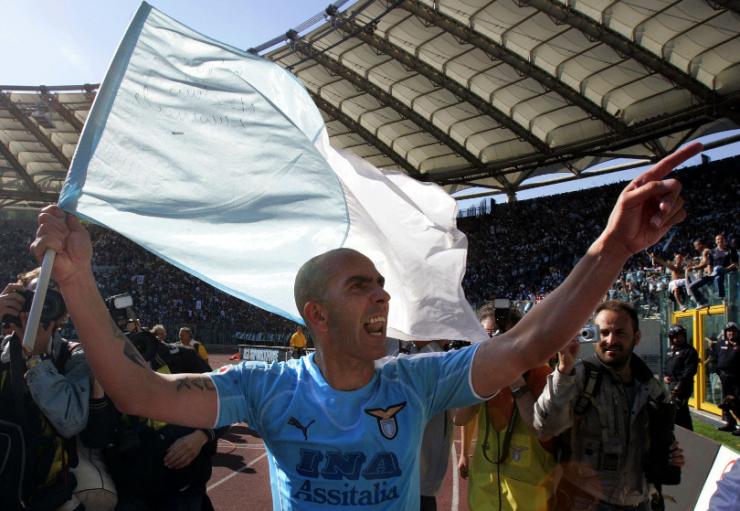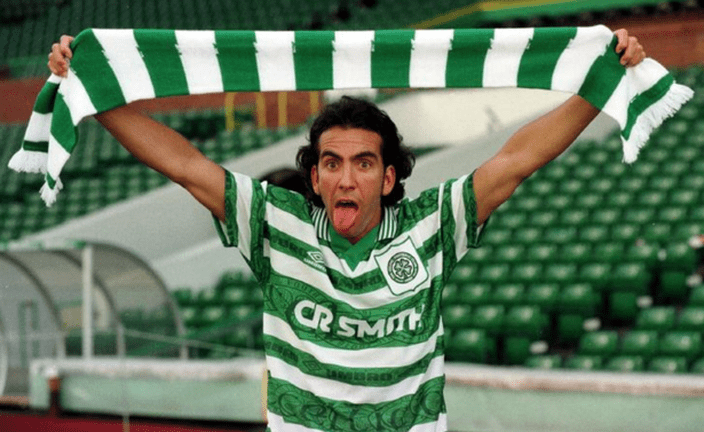Tell me your favourite incarnation of Paolo Di Canio and I’ll show you what kind of football fan you are.
If it’s first-time-scissored-volley-vs-Wimbledon-Di-Canio, you are probably a purist. If it’s catching-the-ball-while-the-Everton-keeper-is-down-injured-Di-Canio, you are a romantic. If it’s “Roman”-salute-under the-Curva-Nord-Di-Canio, you are either a fan who enjoys off-field controversy or hold highly questionable political views. Finally, if it’s the pushing-over-referee-Paul-Alcock-Di-Canio, you have a taste for the absurd.
In truth, these are just a few examples of the genius, eccentricity and controversy that have defined the Italian’s career. I could go on to include the Di Canio that scared the shit out of Nigel Winterburn with a glaring look, or the Di Canio that belted a volley past Chelsea’s Carlo Cudicini from outside the area and many others.
But how is this possible? How can one man find himself at the centre of so many wildly varied incidents, both good and bad, as to become a human Rorschach test? While Di Canio certainly showed flashes of technical brilliance during his time with Sheffield Wednesday, West Ham and Charlton he couldn’t be said to be a Premier League great. Nonetheless, his ability to court controversy meant that the Roman attacker became a cult figure of 90s football and an emblem of the wealth of foreign talent that poured into the Premier League.
Since you ask, my favourite version of Di Canio comes from his days as a coach: the sliding-on-his-knees-down-the-touchline-at-St-James’-Park-Di-Canio. An easy choice for a Sunderland fan, you might say: we had just beaten our local rivals 3-0 to give ourselves hope of Premier League survival. However, there’s a bit more to this moment than its mere association with a great result. It’s about catharsis, the sheer release of winning, and winning at rival’s ground after such a long wait. We would have all been sliding down that touchline if we could, and I think Paolo knew that instinctively.
It’s that understanding that links the episode at St James’ Park with a very different episode that followed soon afterwards. During a team meeting with players who, in Di Canio’s view were refusing to play for him and trying to undermine his authority, the Italian allegedly spat *IN HIS OWN FACE* in order to illustrate the disrespect with which the squad were treating him.
Di Canio’s dismissal, which followed shortly after, was probably unavoidable. But at the time, the gesture did inspire some sympathy among Sunderland fans. As the club struggles in the Championship following four years of under-performance by many of the same players who drove Di Canio to despair, it is not uncommon to hear Sunderland fans shake their heads and mutter “Paolo knew”. To put it another way: if you’re a Sunderland fan and you haven’tfelt like spitting in your own face with sheer frustration at some point in the last four years, you haven’t been paying attention.
So while it is common to dismiss Di Canio’s antics as those of a stereotypical emotional Italian (or, more dangerously, to attempt to diagnose or pathologise his behaviour without the medical qualifications or direct contact necessary), I think there is a more interesting explanation for his behaviour.
At the core of elite football, there is a contradiction that is well known but seldom acknowledged. It is the contradiction of trying to square the circle between playing for, and supporting , two different football teams. Anyone who has ever tried to do both knows that it is simply not possible. In reality, the weekly matches that kids and youth players have to play if they want to become professionals take place at the same time as those of the team they support. Even when there isn’t a direct clash, the time and dedication required to become a player, makes being a supporter virtually impossible.
What is odd is that we pretend this isn’t the case, we talk about academy kids, local lads, one-club men and players returning to the team they supported as a boy. As if the man on the pitch has somehow been plucked from the stands when we know it’s not quite the case: they never properly supported the team, they were too busy playing.
And this is where Di Canio is almost unique. From the late 1970s to the mid-80s, he played for SS Lazio’s youth teams on the Saturday, leaving him free to support Lazio on the Sunday. Di Canio’s support went well beyond that of an armchair fan, travelling around Italy to support his team, something which is less popular in Italy than it is in England, and falling in with the Lazio ultras, the Irriducibili. Di Canio’s autobiography breathlessly relays stories of away days with the notorious Irriducibili, terrorising fellow train passengers, scrapping with rival ultras groups and being battered by the police.
This was unusual enough for a player who was at his peak in the 90s, but it is utterly unthinkable now. It was hard enough for Di Canio, who had to carefully conceal what he was up to from his coaches, at one point being recognised by the team physio as he treated an injured player on the touchline. With the increase in professionalism and the careful management of youth players over the last 30 years, surely any would-be Di Canio would find it impossible to follow his team around the country and still make it in the professional game. As the man himself says:
I do not think that there are many footballers who were also fans when growing up, at least not the kind of fan I was. Maybe supporters can sense that when they see me play, and perhaps that’s why I think they appreciate me in a special way.
From the way he played the game to his interactions with his coaches, Di Canio crossed that unbridgeable divide between fan and player.
Paolo Di Canio: Passion and conflict north of the border
In the modern age many players can seem to conduct themselves with a certain bloodless professionalism, both on the pitch and especially in post-match interviews. This is not intended as a criticism of the players, it is the inevitable result of an extraordinarily finely-honed system of selecting and developing players and the improvements in the quality of play is undeniable. However, it is equally understandable when fans, particularly those of a certain age, are bewildered by the apparent joylessness of young pros: surely they should be ecstatic every day just to be playing?
Of course, for the players, football is a job and one they have to take incredibly seriously in order to be successful. This lack of understanding is just one example of how far the lives of these two football classes, the players and the fans, have diverged from one another. This is a price that is entirely worth paying, but it is a price nonetheless and something that needs to be acknowledged in the increasingly estranged, and at times fractious, relationship between players and supporters.
Di Canio didn’t just show passion (another well worn Italian cliché), he also had a knack for tapping into the feelings of the supporters and responding as they might if they were in his shoes. This included, telling managers and chairmen when he thought they were making the wrong calls (as he apparently did both at Celtic and Sheffield Wednesday), or demanding that he be substituted, so outraged was he by a series of bad refereeing decisions (as he did in one game for West Ham). While at Celtic, Di Canio even indulged in some full on radio phone-in conspiracy theory, noting, from beneath his tinfoil hat, that he played for a Catholic club in a league where the majority of the referees were protestant.
I think this explains why the calls persist, in some quarters at least, for Di Canio to be installed in the dugout at West Ham. Exiled from their historic home and bewildered with some of their player’s performances, fans long to at least feel understood.
His unusual background also explains why Di Canio felt happiest playing in England where, during the 90s at least, the march towards diligent professionalism was less advanced than in his native Italy. Now, of course, the Premier League has caught up in that respect and the chance of another hardcore fan making it as a player has shrunk to virtually nil.
This is a shame, because while not everyone loved Di Canio (and many hated him), fans at least felt that they understood him and, perhaps just as importantly, he probably understood them too.


